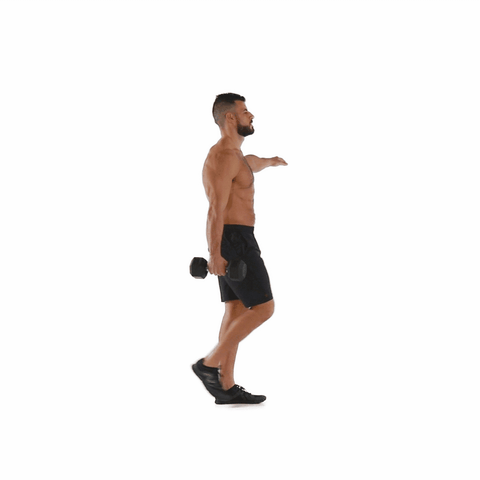You want that perfectly chiseled six-pack, the ripped set washboard abs right out of superhero movies and underwear commercials. So you start doing sit-ups. And at some point, you realize you want to chisel out the sides of your core, too.
So you start playing with oblique crunches. This is the first oblique exercise that plenty of people try, a basic exercise that feels a little bit different than a standard crunch or sit-up. The oblique crunch isn’t the best choice of oblique exercises, but it is a quick, easy bodyweight move that anyone can do, anytime, anywhere.
The first key, however, is executing it correctly. In the long run, though, you’ll want to master the oblique crunch, then graduate to a series of better oblique moves that’ll challenge your core and build your six-pack in better, stronger ways.
The Oblique Crunch
Doing the oblique crunch is simple: Lie on your back, as if about to do a sit-up. Your hands should be behind your head, supporting your neck. Don’t let your chin touch your chest, though; imagine you have an apple between chin and chest the entire time.
Now cross your right foot over your left, and lower your right thigh, knee still bent, to the ground. Glue that left thigh to the ground. Keeping your torso rigid, crunch up as high as you can, lifting your shoulder blades and as much of your torso off the ground as possible. Lower with control.
When, how often, and how many?
Aim to do 3 sets of 20 to 30 reps per side, to develop general core strength. Your core can be trained daily, so you can do this move whenever you want. Aim to do it at the end of your workout.
But wait, you said there are better oblique moves?
Yes. The oblique crunch isn’t bad, but it’s not teaching you to use your core (or your obliques) the way you would in real life. Your obliques function, among other things, to resist and create rotation at the torso. Using them to do this will build muscle and carve that lean washboard look you want, while also prepping you for real-world actions, like lifting a box from an awkward angle, or hitting a baseball or golf ball a long way.
Here are three alternatives to oblique crunches that can build the core you want.
Pallof Press
The Pallof press allows you to hit your whole core—along with your obliques, you’ll work your abs, lower back, and glutes, especially if you perform a kneeling version of the exercise. You can do the move with either a cable and handle attachment or a resistance band wrapped around a stable anchor at about chest height.
Grab the handle of the cable or band in both hands, holding them in the center of your chest. Squeeze your core, and press your arms forward. Hold the position out for at least 2 seconds. After you’ve finished all of your reps on one side, switch to the other. Try starting with 3 sets of 8 to 10 reps.
To make the move even more challenging, hold your arms out for even longer, squeezing your glutes and core to stay stable. Add another dimension the Paloff press by starting in a high kneeling position, or with one knee staggered in front of the other.
Uneven Hollow Rocks
The hollow body hold is a brilliant core exercise that forces your abs to fulfill one of their key functions: Keeping your ribcage tight. To get into the hollow body hold, you simply lie on the ground, press your low back into the ground, and maintain that while lifting your straight legs and shoulder blades into the air just slightly.
The uneven hollow rock adds even more challenge to that, and stresses your obliques more. You hold a light dumbbell in each hand, extending one hand over your head, and one hand out to your side as far as possible. Simply holding the hollow rock with these weights will challenge your obliques; the arm extended out to your side will make your torso want to rotate, and it’s your job, in this move, to make sure that doesn’t happen. Hold for 10 to 15 seconds, then switch sides.
Once you’ve mastered that hold, learn the uneven hollow rock, which has you maintaining that core tension while rocking back and forth. Try the circuit above for a serious oblique challenge.
Single-arm Farmer’s Carry


Men’s Health
The single-arm farmer’s carry has you holding a heavy weight on one side of your torso and just . . . walking. This offset load will pull your torso off-center, but you shouldn’t let that happen. As you’re walking, you have to turn your obliques on to straighten your torso and maintain good posture.
This is an excellent real-world finishing move for your core that can be used in a variety of ways. Use it to start off your workout, walking for either distance (think 10 to 15 yards with each arm, 2 sets) or time (30 seconds per arm, 2 sets). Or use it as a finisher, walking for distance or time.
For more tips and routines from Samuel, check out our full set of Eb and Swole workouts. If you want to try an even more dedicated routine, consider Eb’s New Rules of Muscle program.
Source: Read Full Article
